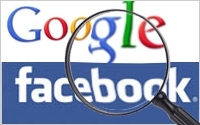 Analyzing sentiment has become second nature for online marketers prior to designing ads and bidding on media. Many consider a slew of triggers like location, keywords, interests, and soon
inflections, as voice search grows in popularity. Since search marketers focus intensely on keywords, consider the sentiment and the words from the Google and Facebook earnings calls earlier this
week.
Analyzing sentiment has become second nature for online marketers prior to designing ads and bidding on media. Many consider a slew of triggers like location, keywords, interests, and soon
inflections, as voice search grows in popularity. Since search marketers focus intensely on keywords, consider the sentiment and the words from the Google and Facebook earnings calls earlier this
week.
On Google's earnings call Thursday, SVP and CFO Patrick Pichette said global paid click growth rose 31% year-over-year, and 13% sequentially, while the aggregate cost per click fell 11%
and 2%, respectively, but there was little mention, if any, of Google+ or social. Nor did analysts bring up Mark Zuckerberg's comment earlier in the week that Graph Search would come to mobile, which
could possibly get support from its ad server Atlas.
advertisement
advertisement
After calling Facebook a "mobile company" during Facebook's earnings call, Zuckerberg said to soon expect a mobile version of its search
engine Graph Search."I think that's going to be an important step, because most of the usage in Facebook overall is on mobile, so we expect that’s where engagement will really start to come from
on Graph Search over time," he said.
Graph Search indexes more than a trillion connections between people, interests, events and groups, per Facebook. More than a trillion status updates,
unstructured text posts, photos and pieces of content that people have shared during the past 10 years, and indexing have all created a massive job.
Facebook's search engine will roll out on
mobile so people can use voice recognition to ask questions, look for information and solve problems. Its effort to excel in search marketing will make results more personal, but it will take about a
decade, and some of those years are in the past. Zuckerberg also spoke about a ten-year strategy focusing on the work being done on Graph Search supported by the open graph and internet.org.
One thing is for certain -- the absence of CEO Larry Page from the call changed the mood. It was more subdued. Rather than focusing on numbers and measurable achievements, Pichette's big news
focused on Google's stock split. In the earnings call, Pichette said Google's board has finally approved a stock split. The issuance date is set for April 2, with public trading beginning on April 3.
The plan means creating a new class of "C'' share that has no voting power. The Class C shares will trade under the original ticker GOOG, while the Class A shares will trade under a new
ticker, GOOGL. Each share of voting Class A stock owned as of March 27 will get a share of C stock. The two types of shares will get a current stock that is divided, equal in value.
Other Q4
and annual earnings release highlights include Google Play, which has 20 million songs, thousands of movies, textbooks, and music. Newsstand brings together more than 2,000 free and paid news sources
including newspapers like The New York Times, The Wall Street Journal, and Financial Times. YouTube has more than 1 billion viewers per month, up 50% in daily watch time
compared with last year. Finally, three videos from brand marketers were on YouTube's list of top 10 videos in 2013 for the first time.
I found comparisons of the two earnings calls to be
revealing.